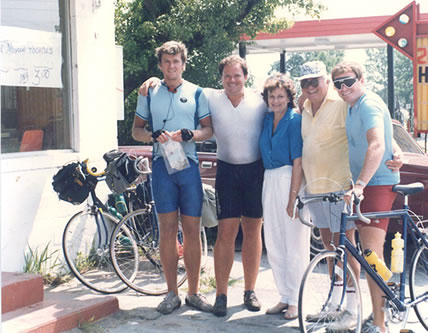
Patrick Byrne from Overstock.com and his company made headlines for suing the state of New York over the issue of affiliate taxes. This issue doesn’t just affect New York, as it could soon be the same nationwide. From my previous general knowledge about Patrick, I thought he was a bit of a crackpot. As I learned more about him, I came to the conclusion that he’s a very bright guy who is surrounded by the right people and has plenty of resources behind him. He’s someone I now respect a lot, and I think you should too – he’s been unfairly bashed by the media. This interview is a good one.
Full Interview Audio and Transcript
Personal Info
Hobbies and Interests: Outdoors Guy, Hiking, Backpacking, Climbing.
Favourite Sports Teams: Washington Redskins, Utah Jazz.
Favourite Books:
- One Flew Over the Cuckoo’s Nest by Ken Kesey
- Sometimes a Great Notion (Penguin Classics) by Ken Kesey and Charles Bowden
- Zen and the Art of Motorcycle Maintenance: An Inquiry into Values by Robert M. Pirsig
Favourite Entrepreneurs: Steve Jobs.
Company Website: http://www.overstock.com
Fast Track Interview
Adrian Bye: Today, we are talking with Patrick Byrne, the CEO from Overstock.com. Overstock has been in the news recently because of lawsuits filed in New York related to affiliate taxes. Now, we’re going to hear Patrick’s side of the story.
Patrick Byrne: I’m glad to be here, Adrian. As background, I was born in Indiana, grew up in New England, and spent a few years outside of Washington, D.C. I have lived all over the country and in different places around the world.
My father, who was the CEO of GEICO, knew Warren Buffet. As a result, Mr. Buffet would stay at our house at times. When I look back through the course of my life, the whole trajectory of my life was changed with the half-dozen conversations I had with him as a teenager. He taught me ways to think about business and other aspects of life.
Through the nineties, I moved around the United States. I spent a lot of time bicycling, backpacking, climbing, and skiing. I made Salt Lake City the base of my business operations because Utah is a great place for the outdoors life.
In 1999, Overstock came along. It was a little company in the flea market business that was supplying people who were selling items at flea markets. They were struggling to open a site, and then they were going out of business. I stepped in and bought a majority share of the company. Three to four months later, Overstock.com launched.
Adrian Bye: What appealed to you about Overstock?
 Patrick Byrne: I saw it as a perfect retail niche to put online. In normal retail, the retail supply lines are optimized for mass quantities of identical goods from a small number of suppliers. Sometimes, the goods become available in small quantities. There are a hundred different possibilities why you can end up with small quantities of 50 or even 2,000 items. For example, somebody cancelled an order, only nine-tenths of an order sold, a truck overturned, or someone went bankrupt. Generally, the quantity left is too small for the mainstream retail system.
Patrick Byrne: I saw it as a perfect retail niche to put online. In normal retail, the retail supply lines are optimized for mass quantities of identical goods from a small number of suppliers. Sometimes, the goods become available in small quantities. There are a hundred different possibilities why you can end up with small quantities of 50 or even 2,000 items. For example, somebody cancelled an order, only nine-tenths of an order sold, a truck overturned, or someone went bankrupt. Generally, the quantity left is too small for the mainstream retail system.
Then people who are called jobbers step in and clean up those small lots. These are the guys who wheel and deal at the very fringes of retail by cleaning up the mass retail supply chain. The market compensates them for the fact that they don’t have mass efficiencies by letting them pay half of normal wholesale price. Overstock was doing this by buying and using faxes to resell to people who sold at flea markets. I said, “That’s a perfect little business to move to the Internet.” I never would have seen this opportunity for what it was if I hadn’t been exposed to Mr. Buffet.
Adrian Bye: As a company, you have had a lot of growth, but it has not been easy.
Patrick Byrne: We had four or five good, fat years and a couple of lean years, but we are coming back into the fat. We’re in a positive cash-flow and positive EBITDA situation. We have been positive EBITDA for three quarters now. Things are coming along rather nicely, but we are looking forward to GAAP profitability. We’ve built the company to be profitable when it is around a billion dollars of net sales. Last year, we had $800 million, and we grew 27 percent in the first quarter.
Adrian Bye: How does the model work for liquidating stock? Can jobbers get a better return by taking liquidated stock and selling it on eBay rather than sending it to Overstock?
Patrick Byrne: No, not at all. There are a lot of disadvantages for liquidating a high-end brand on eBay. While the classic English auction, which is what eBay uses, is very good for liquidating one-offs, it is not a great system to auction large amounts of commodity goods one at a time. For example, you have a thousand identical $100 North Face parkas. Your first one auctions for $30.The next one goes for $28.Your next goes for $27. By the time you have a number of auctions close, the prices have collapsed, and you’re giving them away. It’s also going to take a year to sell a thousand parkas if you have an auction ending every eight hours.
Another disadvantage is that the distributors and stores will desert the jobbers if they sell on eBay. Furthermore, if you are a retailer selling a $2,000 Cartier watch and Cartier is liquidating watches on eBay at $500, you’ll be furious.
Compare that with a manufacturer, a distributor, or a retailer with whom we work. We directly buy their overstock, load it into our truck, take it to our warehouse, and put it on our site. They get cash up front and don’t have to drop ship one at a time. Most manufacturers are more attracted to this method rather than liquidating through eBay.
Adrian Bye: Do they have an inherent advantage to working with someone like you versus someone with a small operation?
 Patrick Byrne: Yes. In this business, you want to do large amounts of take-alls where you buy all the stock. When someone wants to get out of a warehouse or a product, they want somebody to come in and take care of all of it instead of cherry-picking. We’re now at a place where we can do that.
Patrick Byrne: Yes. In this business, you want to do large amounts of take-alls where you buy all the stock. When someone wants to get out of a warehouse or a product, they want somebody to come in and take care of all of it instead of cherry-picking. We’re now at a place where we can do that.
Adrian Bye: You went public via a Dutch auction. I didn’t follow your company going public. However, when Google went public this way, negative things came out about them. Is the negativity a result of using a Dutch auction instead of the regular IPO process to go public?
Patrick Byrne: The negativity was caused by the banks. They hate the Dutch auction process because they like to be in a position of allocating guaranteed profits so they get kick-backs. The Dutch auction removes this allocation mechanism, so they don’t get kick-backs. As a result, they stand shoulder-to-shoulder and try to keep anyone from using the Dutch auction.
We saw this happen when we went public using the Dutch auction two years before Google. You’re basically breaking up an old-boy network when you go with a Dutch auction. I was actually told, “You’ll be a pariah for life if you go ahead with this.” Other bankers said, “Even if we want to cooperate with you, there’d be repercussions for us up and down Wall Street if we did.” They really don’t want to see the Dutch auction get any traction.
Hambrecht was willing to work with everybody. The other banks said, “Bank “A” will work with bank “B.” Bank “B” will work with bank “C.” But none of us will work with Hambrecht.” That right there made my decision with whom I was going to work.
Google made a tactical mistake by drawing other banks into the Dutch Auction. Evidently, they said, “Look, if no one will work with Hambrecht, who does the Dutch auction, we’ll only do it with them.” At that point, some of the banks buckled because no one wanted to be left out of the Google deal, which was the tech deal of the year and the decade. They all said, “Just this once, we’ll work in the Dutch auction.” When they got in, I believe they made a very organized and orchestrated attempt to sabotage Google’s Dutch auction.
Adrian Bye: As well as being a business entrepreneur, you’re also a social entrepreneur with Worldstock. How is that doing?
Patrick Byrne: It’s doing beautifully. It’s a terrific program. Our dream is to see tens or hundreds of thousands of people make a living around the world in non-exploitative circumstances by keeping traditional crafts alive in environmental-friendly ways. It can be a very powerful grassroots bottom-up developmental tool.
Adrian Bye: A lot of negative things are written about you. Why is that?
Patrick Byrne: Well, I’d also like to point out there’s a lot of good stuff too. Three years ago, I publicly said the establishment is corrupt with very deep problems surrounding hedge funds, the SEC, and the financial press.
When you say the types of things I did about the establishment, you can be sure that the establishment is going to react. Also, a great deal of it is an attempt to keep the public from understanding what I am saying and have said. In essence, this group of people on Wall Street created this public barrage of negativity to try to deafen the public to my actual claims.
Adrian Bye: Let’s talk about the affiliate tax issue. You dropped all your New York affiliates, and now you are suing New York State. What’s happening in this area now?
Patrick Byrne: About 15 years ago, the Supreme Court found that you cannot hold a catalog company responsible for collecting out-of-state sales tax. There are 7,200 taxing jurisdictions in the United States. In some jurisdictions, cotton candy is candy. In some, cotton candy is food, and food and candy have different tax rates. A company in Utah, for example, cannot sit here and know the right way to tax every possible product in Paducah, Kentucky. It is impossible.
 The Supreme Court wisely said that the burden cannot be put on the out-of-state retailer. Therefore, I think New York’s law is directly unconstitutional. We’re not suing the state for any money. We’re suing to enjoin them from ever acting upon this law, and we’re trying to get the Court to throw out the law.
The Supreme Court wisely said that the burden cannot be put on the out-of-state retailer. Therefore, I think New York’s law is directly unconstitutional. We’re not suing the state for any money. We’re suing to enjoin them from ever acting upon this law, and we’re trying to get the Court to throw out the law.
We had to drop the affiliates because of the risk of not collecting the affiliate tax and then someday having New York win. We would get dinged for that. So we had to drop the affiliates immediately.
The decision to seek an injunction is the right long-term thing to do. We have a law firm in New York, and we’re putting hundreds of thousands of dollars into this.
Adrian Bye: Do you have a large affiliate program or is most of your revenue from Super Bowl ads and type-in traffic?
Patrick Byrne: Affiliates are very nice double-digit percentage of our business. The outside sees our growth of $200 to $800 million, and it may look like it was all smooth. It really was four to five different things we found that worked. One of the big ones is the affiliate business.
We were doing less than $1 million a year in affiliate business when we discovered this was a great opportunity for us. The affiliate business is still a very healthy chunk of our business, larger than $100 million.
Last year, Amazon dealt a real blow to their affiliate program by basically saying they were going to stop paying affiliates or only pay a drastically reduced fee on a wide range of products. Our affiliates bring us value, and we have supported them. We’ve regularly won prizes such as “Merchant of the Year” and “Program of the Year” from Link Share. That is a testament that we, as a company, take our affiliate team very seriously.
Adrian Bye: Are you interested in getting additional support from affiliates on this affiliate tax issue?
Patrick Byrne: We would very much like any help. If you can reach out to anybody, have them get in touch with our Senior Vice President of Legal Affairs or our General Counsel at the company. We’d love to have anybody help us put political pressure on the legislature. This was Eliot Spitzer’s idea, and his replacement has signed this. We just think it’s a bad idea for New York. Additionally, other jurisdictions are going to watch us fight this in New York. Based on how it plays out in the Courts there, they’ll then decide whether or not to go ahead with it as well.
Adrian Bye: Are there any other ways the affiliate network or major publishers can help you? What kind of resources do you need?
Patrick Byrne: We don’t need money. It is great when people write their State legislators. In the last two years, I have spent a lot of time with politicians at every level. I used to think, “I’m going to write a letter to my congressman.” Then I assumed it sat on the basket and didn’t matter. I’ve learned that it does matter, and they do pay attention. They track how many letters they receive on every subject. Writing letters, in this case to your State legislators, is much more effective than the general population understands. They will respond and not just by answering back with a form letter. If 100 or 200 of the 3,400 affiliates with whom we severed relationships wrote different State legislators, it could make an enormous difference in Albany.









